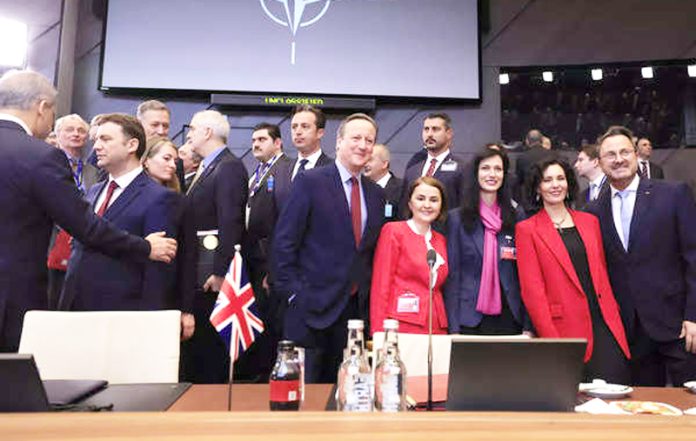BRUSSELS, Apr 4 : NATO will celebrate on Thursday 75 years of collective defense across Europe and North America as Russia’s war on Ukraine enters its third year and sorely tests the allies’ resolve while rising populism gnaws at their unity.
At a cake-cutting ceremony in Brussels, U.S. Secretary of State Antony Blinken and his counterparts will mark the moment the alliance’s founding treaty was signed on April 4, 1949, in Washington. A bigger celebration is planned when NATO leaders meet in Washington from July 9 to 11.
Sweden’s foreign minister, Tobias Billström, is taking part in the first ministerial-level meeting since his country became NATO’s 32nd ally last month. Russia’s full-scale invasion of Ukraine in February 2022 drove Sweden and its Nordic neighbor Finland into NATO’s arms.
The alliance’s ranks have almost tripled over more than seven decades from its 12 founding members, but Finland and Sweden joined in record time to shelter under NATO’s collective security guarantee, after coming under pressure for compensation from populist leaders in Turkey and Hungary.
That promise — Article 5 of the Washington Treaty, which has been shipped to Brussels for the ceremony — stipulates that an attack on any one of their number must be met with a united response. It’s only ever been used once, after the Al-Qaeda attacks on U.S. Soil in 2001.
“NATO was founded on a single, solemn promise: An attack on one ally is an attack on all,” NATO Secretary General Jens Stoltenberg said on the eve of the anniversary. “From that foundation, we have built the most powerful and successful alliance in history.”
Blinken described NATO as “a defensive alliance with no designs on the territory of any other country, but with a determination to protect the territory of each of its members and to do it in a way that has been unique in human history.”
Among the more recent successes as it grew from the Cold War and after the Berlin Wall collapsed, NATO would count its 1999 air campaign against former Yugoslavia to end a bloody crackdown on separatist ethnic Albanians and its effort to avert near civil war in Macedonia in 2001.
At the other end of the scale lies the operation in Afghanistan. NATO took command of the security effort in 2003 and it became the longest, costliest and deadliest in alliance history. It was marked by a chaotic retreat in August 2021, many of the successes over almost two decades abandoned.
Today, Ukraine also wants a seat at NATO’s table, but the alliance works on unanimity and there is no consensus on whether it should join. Most allies oppose membership while war rages on anyway. For now, NATO promises only that its door is open for Ukraine to walk through one day in the future.
Putin said he launched the war, in part at least, because NATO was expanding closer to Russia’s borders.
NATO allies cannot agree on whether to arm Ukraine either. As an organization, the alliance only provides non-lethal support like transport vehicles, fuel, combat rations, medical supplies and demining equipment. However, many members provide arms and ammunition bilaterally or in groups.
The bulk of NATO’s efforts since Russian troops began massing for the invasion has focused on reinforcing its own borders near Russia and Ukraine to dissuade President Vladimir Putin from targeting any of the allies next.
Article 5 was given perhaps its toughest test during Donald Trump’s term as president of the United States – by far NATO’s most powerful member country. Trump suggested the U.S. Might not come to the defense of any NATO ally who declined to boost their own defense spending to at least 2% of gross domestic product, as they had agreed to do in 2014.
Trump has repeated the threat during election campaigning this year. NATO predicts that 18 of its 32 members will reach that target this year, up from only 3 a decade ago.
Hungary and Turkey’s leaders have also undermined NATO unity from within. Hungary insists that it’s time to make peace with Russia and has in the past vetoed high-level meetings with Ukraine. Turkey, backed by Hungary, also delayed Sweden’s membership to win defense contract promises.
The two are likely to test their partners’ patience again as NATO seeks a replacement for Stoltenberg, who is one of the longest-serving secretaries-general and steps down in October. Dutch Prime Minister Mark Rutte is by far the favorite for the job. Hungary and Turkey, once again, have reservations. (AP)


